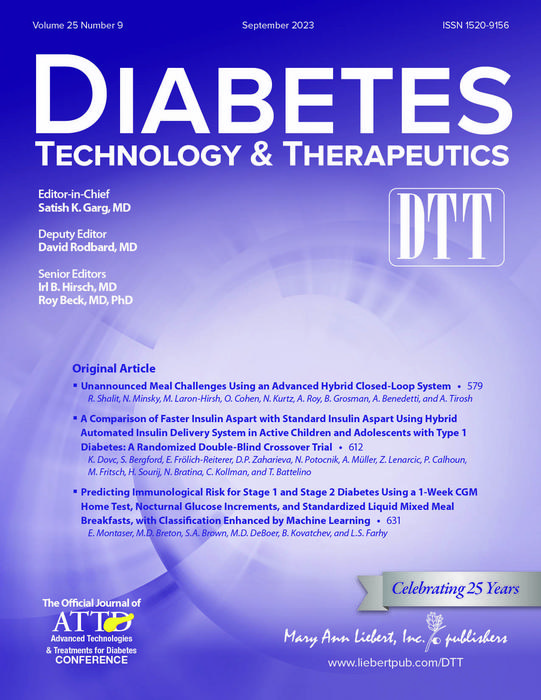A new study endorses closed-loop use in type 1 diabetes pregnancy and highlights how the technology can facilitate positive pregnancy experiences. The study is published in the peer-reviewed journal Diabetes Technology & Therapeutics (DTT). Click here to read the article now.

Credit: Mary Ann Liebert Inc., publishers
A new study endorses closed-loop use in type 1 diabetes pregnancy and highlights how the technology can facilitate positive pregnancy experiences. The study is published in the peer-reviewed journal Diabetes Technology & Therapeutics (DTT). Click here to read the article now.
Julia Lawton, from the University of Edinburgh, and coauthors, on behalf of the AiDAPT Collaborative Group, interviewed closed-loop participants in the Automated insulin Delivery Amongst Pregnant women with T1D (AiDAPT) trial. “Women described how closed-loop lessened the physical and mental demands of diabetes management, enabling them to feel more normal and sleep better,” reported the investigators. “By virtue of spending increased time-in-range, women also worried less about risks to their baby and being judged negatively by healthcare professionals.”
“To realize fully the benefits of closed-loop, pregnant women would benefit from initial, intensive oversight and support together with closed-loop specific education and training,” stated the investigators.
“No closed-loop system is approved in the U.S. for pregnancy use as the targets needed are much tighter during pregnancy associated with T1D,” states Satish Garg, MD, Editor-in-Chief of Diabetes Technology & Therapeutics, and Professor, University of Colorado Denver, Barbara Davis Center for Diabetes. “The only system that allows that is CamAPS FX, which is approved in Europe and Australia. The percentage of time that participants spent in the pregnancy-specific target glucose range (63 to 140 mg/dL) as measured by glucose sensors from 16 weeks’ gestation until delivery was significantly higher among participants in the closed-loop group than among those in the standard-care group, with a difference between groups of 10.5 percentage points. I recently wrote an editorial in the New England Journal of Medicine on this topic: Technology Use and Glycemic Outcomes during Pregnancy with Type 1 Diabetes. NEJM, 2023 DOI:10.1056/NRJMe2310798, PMID: 37796238.”
About the Journal
Diabetes Technology & Therapeutics (DTT) is a monthly peer-reviewed journal that covers new technology and new products for the treatment, monitoring, diagnosis, and prevention of diabetes and its complications. Led by Editor-in-Chief Satish Garg, MD, University of Colorado Denver, Barbara Davis Center for Diabetes, the Journal covers breakthrough technologies and new therapeutic drug classes, behavioral aspects and approaches to diabetes care, and the latest advancements and applications of new and emerging technologies including continuous glucose monitoring, alternate insulin delivery methods, artificial pancreas, telemedicine and computerized case management, new insulins with ultra-rapid onset of action, and detection and prevention of hypoglycemia. Tables of contents and a free sample issue may be viewed on the Diabetes Technology & Therapeutics (DTT) website. DTT is the official journal of the International Conference on Advanced Technologies & Treatments for Diabetes (ATTD).
About the Publisher
Mary Ann Liebert, Inc. is a global media company dedicated to creating, curating, and delivering impactful peer-reviewed research and authoritative content services to advance the fields of biotechnology and the life sciences, specialized clinical medicine, and public health and policy. For complete information, please visit the Mary Ann Liebert, Inc. website.
Journal
Diabetes Technology & Therapeutics
DOI
10.1089/dia.2023.0323
Method of Research
Case study
Subject of Research
People
Article Title
Listening to women: experiences of using closed-loop in type 1 diabetes pregnancy
Article Publication Date
5-Oct-2023



